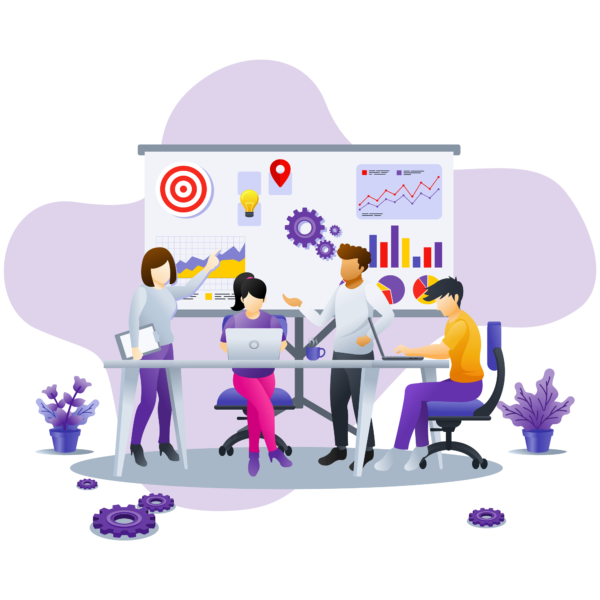This team is incredible. Helped us to grow our business and now the biggest problem we seem to come across is having too much business. Appreciated guys! Looking forward to working with them.

John Smith
Business Developer
Our Major Focus is to Drive Loyal Convertors to our customers through the major digital marketing channels.

Our people define us and show who we are. When we put people to work with the client, they take with them not our knowledge. High standards of professionalism, integrity. Establishment of close working relationships. We do not have to be the best, we do have to give our best. Ability to learn. Multicultural competence. A different way of thinking, both inside and outside the box. We do not have to be the best.
SEO (Search Engine Optimization) is the process of improving your website's visibility on search engines, driving organic traffic, and enhancing online presence by optimizing content, keywords, and technical elements.
PPC (Pay-Per-Click) is a digital advertising model where businesses pay only when users click their ads, helping drive targeted traffic, increase conversions, and achieve measurable results.
SMM (Social Media Marketing) involves using social media platforms to promote products or services, engage with audiences, and build brand awareness, ultimately driving traffic, leads, and sales.
Online Reputation Management involves monitoring, improving, and maintaining a brand's online presence by addressing negative feedback, promoting positive content, and ensuring a favorable public image.
Amazon marketing focuses on optimizing product listings, utilizing paid ads, and enhancing visibility on the platform to drive sales, increase brand awareness, and improve product rankings on Amazon’s marketplace.
Flipkart marketing involves optimizing product listings, running targeted ads, and leveraging promotional campaigns to enhance product visibility, drive sales, and build brand presence within Flipkart's marketplace.
Affiliate marketing is a performance-based strategy where businesses reward affiliates for driving traffic or sales through their promotional efforts, using unique links to track and commission based.
Marketing automation uses software to automate repetitive marketing tasks, such as email campaigns, social media posts, and lead nurturing, allowing businesses to efficiently manage and optimize customer engagement.
Any marketing that uses electronic devices to convey promotional messaging and measure its impact. In practice, digital marketing typically refers to marketing campaigns that appear on a computer, phone, tablet, or other device. It can take many forms, including online video, display ads, and social media posts. Digital marketing is often compared to “traditional marketing” such as magazine ads, billboards, and direct mail. Oddly, television is usually lumped in with traditional marketing.
Did you know that more than 3 quarters of Americans go online on a daily basis? Not only that, but 43% go on more than once a day and 26% are online “almost constantly.”
These figures are even higher among mobile internet users. 89% of Americans go online at least daily, and 31% are online almost constantly. As a marketer, it’s important to take advantage of the digital world with an online advertising presence, by building a brand, providing a great customer experience that also brings more potential customers and more, with a digital strategy.
What is digital marketing?
Digital marketing, also called online marketing, is the promotion of brands to connect with potential customers using the internet and other forms of digital communication. This includes not only email, social media, and web-based advertising, but also text and multimedia messages as a marketing channel.
Essentially, if a marketing campaign involves digital communication, it’s digital marketing.
Inbound marketing versus digital marketing
Digital marketing and inbound marketing are easily confused, and for good reason. Digital marketing uses many of the same tools as inbound marketing—email and online content, to name a few. Both exist to capture the attention of prospects through the buyer’s journey and turn them into customers. But the 2 approaches take different views of the relationship between the tool and the goal.
Digital marketing considers how each individual tool can convert prospects. A brand’s digital marketing strategy may use multiple platforms or focus all of its efforts on 1 platform.
Inbound marketing is a holistic concept. It considers the goal first, then looks at the available tools to determine which will effectively reach target customers, and then at which stage of the sales funnel that should happen.
In today’s fast-paced, tech-driven world, digital marketing has become essential for businesses looking to expand their reach, engage customers, and drive sales. With the rise of social media, search engines, and online advertising platforms, digital marketing offers a vast array of opportunities to boost brand visibility and build lasting customer relationships.
In this guide, we’ll explore the key elements of digital marketing, the benefits it offers, and how to effectively implement strategies for your business to stay ahead of the competition.
Digital marketing refers to any form of marketing that uses digital channels such as search engines, social media platforms, email, and websites to reach and engage potential customers. Unlike traditional marketing methods, digital marketing offers a more interactive, measurable, and cost-effective approach to advertising. It allows businesses to target their audience with precision, track performance in real-time, and adjust campaigns for optimal results.
Digital marketing encompasses several strategies and techniques aimed at reaching specific business goals. Let’s dive into the most important components:
SEO is the process of optimizing your website and content to rank higher in search engine results pages (SERPs). The goal is to attract organic traffic by using relevant keywords, improving site structure, and providing valuable content. SEO involves two main types:
By ranking higher on search engines like Google, businesses increase their chances of attracting more visitors and converting them into customers.
PPC is a paid digital advertising model where advertisers pay a fee each time their ad is clicked. Google Ads, Facebook Ads, and LinkedIn Ads are popular PPC platforms. These ads appear at the top of search results, on social media feeds, or on relevant websites.
PPC campaigns can be highly effective for generating immediate traffic and reaching a targeted audience. Through proper keyword research, ad targeting, and optimization, businesses can ensure they are getting the best return on investment (ROI) from their campaigns.
Social media marketing involves using platforms like Facebook, Instagram, Twitter, and LinkedIn to promote products, services, and engage with customers. The power of social media lies in its ability to connect with users on a personal level, build brand awareness, and foster community engagement.
A successful social media marketing strategy should focus on creating valuable content, running targeted ads, and building relationships with followers. By leveraging analytics and insights, businesses can understand their audience’s preferences and create content that resonates with them.
Content marketing is all about creating and distributing valuable, relevant content to attract and engage a target audience. This content can include blogs, articles, videos, infographics, case studies, eBooks, and more. By offering useful and informative content, businesses can position themselves as thought leaders in their industry, build trust with their audience, and encourage conversions.
Incorporating SEO best practices into content marketing ensures your content reaches the right people. By answering common questions and addressing pain points, content marketing can drive organic traffic and enhance customer loyalty.
Email marketing remains one of the most effective forms of digital marketing, offering a personalized way to communicate directly with your audience. Whether through newsletters, promotional offers, or abandoned cart reminders, email marketing allows businesses to nurture relationships and encourage repeat sales.
A strong email marketing strategy includes segmentation, personalization, and automation. By sending tailored messages based on user behavior and preferences, businesses can increase engagement and conversions.
Affiliate marketing is a performance-based strategy where businesses partner with affiliates to promote their products or services. Affiliates earn a commission for each sale or lead they generate through their unique referral links.
This marketing strategy allows businesses to expand their reach by leveraging the audience and influence of affiliates. It’s a cost-effective way to tap into new markets and increase sales without the upfront investment required for traditional advertising.
Influencer marketing involves partnering with influencers—individuals who have a significant following on social media or other platforms—to promote your brand. Influencers can help increase brand visibility, build credibility, and drive conversions by showcasing products to their engaged audience.
When selecting influencers, businesses should consider relevance, reach, and engagement levels. Authentic partnerships with influencers who align with your brand values will ensure a positive impact on your marketing efforts.
Digital marketing offers numerous advantages for businesses of all sizes. Some of the key benefits include:
Digital marketing is no longer optional for businesses looking to stay competitive in today’s digital world. By implementing effective strategies such as SEO, PPC, social media marketing, content marketing, and more, businesses can enhance their online presence, drive traffic, and ultimately increase sales.
The key to success in digital marketing is understanding your audience, setting clear objectives, and continuously optimizing campaigns for the best results. As digital platforms continue to evolve, staying up to date with trends and embracing new tools will help you stay ahead in the ever-changing digital landscape.
By embracing digital marketing, businesses can not only grow their customer base but also build long-lasting relationships that foster brand loyalty and sustained success.